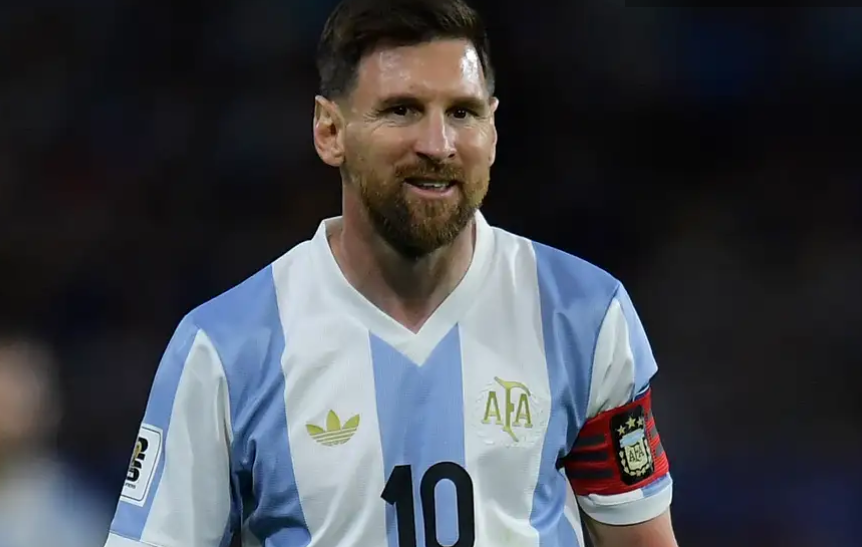Messi repeated the same insult – ‘bobo’ (idiot)
Lionel Messi’s recent World Cup match against Croatia was a highlight of his skill and leadership. His world-class penalty and solo assist showed how he can boost his team’s performance. But it was his actions during the penalty shootout against the Netherlands that really showed his growth.
During the tense penalty shootout, Messi ran towards the Dutch goalkeeper, Andries Noppert. Noppert had saved several penalties, and Messi recognized his importance. This showed Messi’s emotional intelligence and ability to motivate his teammates. It was a moment that showed Messi’s transformation from just a footballer to a leader for Argentina.
Key Takeaways
- Lionel Messi’s performance in the World Cup showcased his exceptional skill and leadership
- Messi’s actions during the penalty shootout against the Netherlands demonstrated his growth as a leader
- Messi’s recognition of the Dutch goalkeeper’s role in the team’s success exemplified his emotional intelligence
- Messi’s evolution from a pure footballer to a guiding force for the Argentine national team
- The World Cup highlighted Messi’s ability to elevate his team’s performance on the biggest stage
Messi’s Leadership Transformation During World Cup
Lionel Messi’s leadership in Argentina’s World Cup win was amazing. He showed his growth from a top player to a true team leader. His actions on and off the field were key to their success.
On-Field Leadership Moments
Messi’s leadership was clear in big moments of the tournament. After beating the Netherlands in penalties, he was quick to congratulate goalkeeper Emiliano Martínez. This showed his appreciation for the team’s win.
Support for Teammates in Critical Moments
Messi always supported his teammates during the World Cup. He comforted players after tough times and motivated the team with his words. His calm and reassuring presence was felt by everyone.
Evolution from Player to Leader
Messi’s role changed from a top player to a leader during the World Cup. He celebrated each team member’s effort while keeping the team united. This showed his growth and understanding of leading a team.
“Messi’s leadership was key to Argentina’s World Cup win. He inspired and supported his teammates, and his performances were outstanding. He was the heart of the team’s success.”
Messi’s World Cup performance and team support were vital in Argentina’s historic win. His leadership set the stage for their victory.
The Controversial Exchange with Weghorst
The heated confrontation between Lionel Messi of Argentina and Wout Weghorst of the Netherlands after their World Cup quarterfinal match was intense. It showed a rare side of Messi, who is usually calm. This incident highlighted the high stakes of the knockout stage.
The match went to a penalty shootout, with Argentina winning. As the players left the field, Messi and Weghorst got into a heated argument. Messi looked visibly upset.
| Player | Successful Dribbles |
|---|---|
| Jamal Musiala (Germany) | 17 |
| Cody Gakpo (Netherlands) | 5 |
| Frenkie de Jong (Netherlands) | 3 |
| Jurrien Timber (Netherlands) | 3 |
| Memphis Depay (Netherlands) | 2 |
| Steven Berwijn (Netherlands) | 1 |
| Denzel Dumfries (Netherlands) | 0 |
The data shows the Dutch team lacked creativity and successful dribbles. This was a big problem for them in the World Cup. On the other hand, Jamal Musiala’s performance for Germany showed how important attacking talent is in football today.
“The successful Dutch football generations were highlighted as being street-produced talent, suggesting a strong link between street football and producing top-tier players, unlike the current youth academy system.”
The Messi Weghorst confrontation showed the intense emotions and competition of the post-match incident. Both teams fought hard for a spot in the semifinals.
Messi repeated the same insult – ‘bobo’ (idiot)
Lionel Messi used the term ‘bobo’ (idiot) again after a key World Cup match. This action caught a lot of attention. People wondered about the reason behind his outburst and how others reacted.
Context Behind the Insult
The atmosphere after the match was very tense. This pressure, along with the game’s intensity, made Messi react strongly. His use of ‘bobo’ was a quick response to the moment, showing his deep love for soccer.
Media and Public Reaction
People had mixed feelings about Messi’s use of ‘bobo’. Some thought it was not sportsmanlike. Others saw it as a sign of his fierce dedication to his team and country.
Impact on Team Dynamics
The incident might have brought the Argentine team closer together. Messi’s boldness in showing his feelings could inspire his teammates. This could strengthen their bond as they work towards their goals.
Argentina’s Tactical Brilliance Under Scaloni
Argentina’s win at the 2022 World Cup showed Lionel Scaloni’s skill. He changed his team’s plans to beat each opponent.
In the quarterfinals against the Netherlands, Scaloni made a bold move. He brought in Emiliano Martínez as a defender. This move stopped the Dutch’s attack, helping Argentina win.
Scaloni’s changes were not just in that game. He knew when to change things to help Argentina win. His team’s ability to adapt was key to their success.
Argentina’s victory under Scaloni shows the power of smart tactics. Scaloni’s strategies and Argentina’s teamwork led to their triumph.
| Metric | Netherlands | Argentina |
|---|---|---|
| Successful dribbles | 17 | – |
| Cody Gakpo | 5 | – |
| Memphis Depay | 2 | – |
| Denzel Dumfries | 0 | – |
| Frenkie de Jong | 3 | – |
| Jurriën Timber | 3 | – |
| Steven Berwijn | 1 | – |
The table shows the Netherlands’ trouble with dribbling against Argentina. With only 17 successful dribbles, they couldn’t get past Argentina’s defense. This proves Scaloni’s smart tactics.
The Psychology Behind Post-Match Confrontations
World Cup matches are filled with intense emotions and high stakes. This can lead to heated arguments between players after the game. These moments offer a glimpse into the minds of top soccer players, where pride and pressure mix.
Emotional Investment in High-Stakes Games
For players, a World Cup match is the peak of their career. It’s the result of years of hard work and sacrifice. The pressure is huge, with national pride and legacies at risk. This can cause players to react strongly, whether they win or lose.
Cultural Perspectives on Soccer Confrontations
Different cultures see post-match arguments in different ways. In some places, the game’s passion is celebrated. But in others, such behavior is seen as unprofessional. This leads to varied reactions from fans and critics.
Managing Pressure in Critical Moments
Handling the pressure of a World Cup is key for players and teams. Those who stay calm and focused often win. Top teams have learned to manage their emotions, staying disciplined under pressure.
FAQ
What highlights did Lionel Messi’s performance against Croatia showcase?
Lionel Messi’s game against Croatia was a highlight reel. He showed off his amazing skill with a penalty and a solo assist. This World Cup also showed Messi’s growth as a leader, seen in his actions on the field.
How did Messi demonstrate leadership during the penalty shootout against the Netherlands?
Messi showed leadership against the Netherlands in the penalty shootout. He ran towards the goalkeeper who saved penalties. This showed Messi’s understanding of his team’s success.
How did Messi’s leadership style evolve from player to leader?
Messi’s leadership style changed from just playing to supporting his teammates. He now focuses on recognizing each player’s effort, showing his growth as a leader.
What was the context behind Messi’s heated exchange with Wout Weghorst?
Messi had a heated argument with Dutch player Wout Weghorst after the Netherlands game. This rare display of emotion from Messi showed the World Cup’s intense knockout stages. The argument happened after a hard-fought match that went to penalties.
Why did Messi‘s use of the insult ‘bobo’ (idiot) gain attention?
Messi’s use of ‘bobo’ (idiot) got a lot of attention. It was because of how often he used it and the big game it happened in. People had different views on it, with some seeing it as unsportsmanlike and others as showing Messi’s passion.
How did Argentina’s coach Scaloni demonstrate tactical acumen?
Argentina’s coach Scaloni showed his tactical smarts by changing the team’s formation. Against the Netherlands, he surprised everyone by adding Martínez as an extra defender. This move helped Argentina win the game.
How do post-match confrontations in high-stakes soccer games often result?
Post-match confrontations in soccer games come from the high emotions and pressure. Different cultures see these moments differently, with some loving the passion. But managing the pressure is key, even more so in the World Cup where national pride is on the line.











